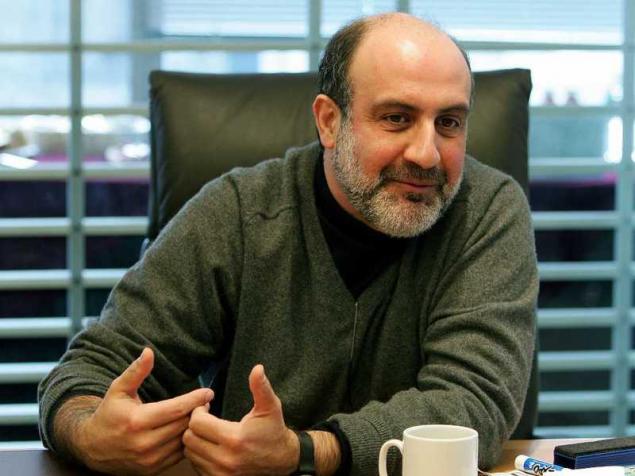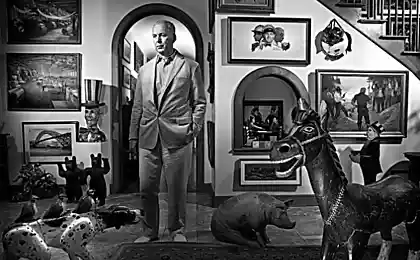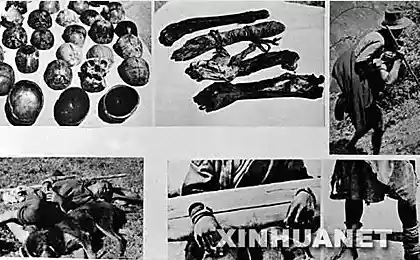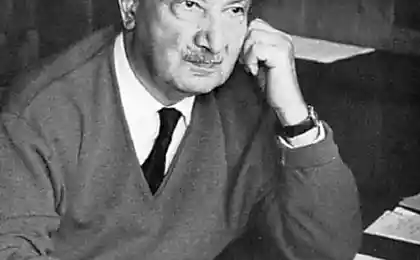815
Nassim Taleb: How to own people in the modern world
Modern "slavery"Nassim Taleb, economist and trader, one of the most important thinkers of the modern world, the author of the theory of "Black Swan"

"In the early days of Christianity, when the Church only began its triumphal March through Europe, were wandering monks — girovago. They didn't belong to a specific order nor a monastery. It was these monks freelancers, as we would say today. They lived by begging or by the benevolence of urban residents, which they were able to interest his teaching. Their population was stable, how could she be sustainable in the case of people who made a vow of celibacy — sustaining population is possible only through recruiting new members. Nevertheless, they survived and the local population gave them food and temporary shelter.
About V century BC, their number began to decline, and later they disappeared completely. In the Church of girovago was unpopular; in the fifth century, their activity is banned for the Council of Chalcedon, and after 300 years — Nicene. In the West, their main opponent was St. Benedict of Nursia — he advocated a more structured model of monasticism, with clear rules, hierarchy and the control of the Abbot (in the end, as we know, it is this concept and won). Benedict came up with a lot of rules. So, rule 33 pointed out that the property of a monk should be controlled by the Abbot and the rule 70 prohibited the monk in the case of anger to beat the other monks.
Why girovago was banned? The fact that they were completely free. Including financial — not because of wealth but because little in need of. Oddly enough, being poor, they remained completely independent — we are taught that for this to make capital, but it turns out that the same can be achieved with nothing.
But, if you are building a religious organization, absolutely free people you don't need. The same applies to building a startup, so we'll talk about employees, and the company or other organization.
Benedict's rule was aimed at removing any hint of freedom in accordance with the principles stabilitate sua et conversatione morum suorum et oboedientia, i.e. "hardness, moral behavior and obedience." To prove his obedience, the future monk had to withstand a one year trial period.
In General, any organization wants to take the associated people of their freedom. How to keep them in your power?First, they need to learn and they need to manipulate; second, it is important to let them know they have your interest in this game is that they have something to lose in case of disobedience — which was not possible with the poor gyrovague who scorned wealth.
For example, the Italian mafia was simple: if the Capo Mafiosi of the ordinary suspects of disloyalty, the latter soon made a trip into one end of the trunk of a car and can rely on the fact that his funeral graced the don. In other professions, the mechanisms for the personal interest of others.
Oddly enough, the employee is more effective than slave, and was so even in antiquity, in the time of worldwide slavery.

Private pilot
Suppose you are the owner of a small airline. You are a modern person, go to conferences and consult with consultants and you are absolutely sure of the corporate structure — it's vulgar, and it is necessary to organize through a network of independent contractors that it is more efficient.
Bob the pilot. You signed a contract with him, which clearly spelled out its commitments and specify the penalty for non-compliance. The duties of the Bob included an invitation to the second pilot and the search for a replacement in case of illness. Tomorrow night, Bob must keep the plane in Munich at the Oktoberfest. All tickets sold, and passengers, postivies the whole year, and looking forward to this celebration of beer and sausages.
Bob calls you at five o'clock and said that he and another pilot are very respect you, but tomorrow won't fly. You know, they got an offer from some Arab Sheikh, he is a very religious person, and for a party in Las Vegas and he needed a crew. The Sheikh and his entourage just fell in love with Bob, and when he said that in life did not drink a drop of alcohol, it turned out that the money is not a problem. The offer is very generous, and it more than covers any penalties for your Bob the contract.
You grab his head. Oktoberfest fly a lot of lawyers, especially the retired, and they do not feed bread, but give to sue — in other cases they do not. And in the aircraft: if the aircraft does not take off, you can't bring those who bought a return ticket, and probably will go awry and the next few flights. And transfer the passengers to other planes is complicated and expensive.
You make a few phone calls, it turns out that it is easier to find a sensible scientist-economist, than the pilot — so the pilot can not be found. All your money invested in this company, and you know that, most likely, you're bankrupt.Have you flashed the thought: but if Bob was your slave, this would not have happened.Yes, not even a slave, just an employee of your company! People with a steady job can't afford. Such tricks can be thrown out of a third-party contractor is nothing but the law, he did not decree. An employee has the reputation in the company and can be fired. Besides, he's not just going to work — he needs a salary!
Yes, employees love to receive an envelope at the end of the month and ready for him at many things. So, if Bob was not a contractor and an employee, all this trouble could have been avoided...
But here's the problem: employees are expensive — they have to pay, even if they have no work. Flexibility is lost. Of course, they are all lazy, but they're always there! Thus, the employees want, because they have a vested interest and risk their well-being — it is sufficient that this risk was a deterrent. They can be punished for a manifestation of independence — for example, for failing to appear for work. For your money, you buy reliability.
And reliability are important to many. For example, wealthy people buy a vacation home, although this is quite inefficient compared to the rental or hotel — simply because, when they suddenly want to go there, he will be waiting.
There is a saying: never buy when you can rent a plane, ship or, uh, partner for sex. Nevertheless, many having private planes, yachts, and even imagine getting married.
However, there is a risk and contractor: this is the penalty written in the contract. But the risks of the employee are always higher. And if the person agrees to work for a salary, is already talking about what type of risk he is willing — the fact is a signal that such a person will bring less of a hassle.
If a man has long employed — so he knows how to obey.
If man deprives himself of liberty for nine hours a day and comes punctually to the office, denying themselves the right to make their own schedule, is a sufficient demonstration of submission. You are dealing with obedient, potty trained pet. Employees are not risk-averse; they fear dismissal more than a contractor lawsuit. Even when the employee leaves, he still tends to be "convenient" for the company, because during work he was very invested in it — and now not inclined to destroy what was built for years.
The company to employee of the industry
So, if employees reduce your risks, you also reduce their risks. Or at least they think so.
At the time of writing these lines of the company remain in the first League in size (included in the S&P 500 index) during the entire 10-15 years. The company leaving the S&P 500 (INDEX: S&P 500 index [US500]) if the merger or when the volume of business, in both cases, this leads to a reduction in staff. However, during the twentieth century of company usually kept in this list for more than 60 years. Large corporations existed longer employees remained in the same organization throughout their life. It was such a phenomenon as a "person" (and almost always he was a male).
"Person" is a key concept in the XX century. Best definition — the person, whose identity is formed in accordance with the wishes of the company. He accordingly dressed and even uses language that expects him company. His social life is so closely connected with the organization that, after leaving her, he will suffer a huge loss, like a banished citizen of Athens. Saturday night he spends in the company of other employees and their wives, sharing by a company's jokes. In exchange, the company enters into a Pact with him that he will save his job for as long as possible, that is, as long as the retirement age would not leave him with a nice amount of money and Golf partners from among former colleagues. This system worked when a large organization has existed for a long time and looked the more permanent units than the nation state.
Somewhere in 1990, the people suddenly began to understand that the role of "company man" is a fairly reliable option, provided that the company is not going anywhere. But the technological revolution occurring in Silicon valley, put the existence of traditional companies is at risk. For example, after takeoff, Microsoft (NASDAQ: Microsoft Corporation [MSFT]) and the proliferation of personal computers, IBM (NYSE: International Business Machines [IBM]), the former main factory of the "people company," was forced to reduce some of their "lifetime" employees who understand that the risk of this risk position was not so low. These employees could not find work anywhere else — they were quite useless outside IBM. Outside of corporate culture did not work even their sense of humor.
Prior to this period, IBM demanded that his employees wear white shirts — not light blue, not pinstripes and pure white. And dark blue suit. Were not allowed any liberties in the clothing, no hint of individuality.You were part of IBM.
Person — the one who believes will suffer huge losses if will not behave as a person, that is, someone who is personally invested in the game.
And despite the fact that "person" seems to have disappeared, his replacement, due to the commonality of tasks came "employee industry" — and now it can be people of any gender. Today he or she owns the company, and something worse: the idea that he or she should be suitable for recruitment.
Employee industry — is the one who fears will suffer heavy losses, losing their suitability for employment that is personally invested in the game.
Suitable for the recruitment of officer tightly integrated into the industry, it keeps the fear to disappoint not only his employer but also to other potential employers.
The employee is, by definition, is more valuable within the company than outside it, and we are talking about value for the employer, not for the market. Perhaps best defines the fit for the employee is that of him never write in the textbooks, as it, in its purpose, has the ability to never leave a mark, and therefore uninteresting to historians.
Ronald Coase and his theory of the firm
Ronald Coase — modern economist. He has an independent creative thinking and a scientific approach, and his ideas are applicable in practice and explain the world around us: in other words, it's real.His style is so flawless that made him famous Coase theorem, an idea formulated without a single mathematical term, and yet has become as fundamental as with many things, written in the language of mathematics.
In addition to his theorem, Coase was the first to shed light on why there are firms. In his opinion, the contracts associated with the conduct of negotiations costly and entails some operational costs, so you should register your own business and hire employees for a position with a clear description of the responsibilities because you want to avoid legal and organizational costs of each transaction.
The free market is the place where specialization determined by market forces, and source of information is the price target; however, of these forces act, as they cost more than they brought benefits. Therefore, the firm will maintain the optimal ratio of the number of employees and number of external contractors, and the presence of a certain number of staff even when it is not effective, rather than the consumption of a large number of resources on negotiation of contracts.
We see that the Coase stopped just a step away from the concept of personal contribution to the game. He never thought in terms of risk, and it might help him to understand that the employee is a risk management strategy.
If economists, Coase and SMOS even slightly interested in ancient history, they would have been familiar with the risk management strategy, which has relied the Roman family, usually appointing for the position of Treasurer responsible for the finances of the family and its property. In fact he is a slave. Because a slave can be punished much more harsh than a free man or a Freedman — and it does not need the intervention of the law. Irresponsible or dishonest Manager can make you bankrupt, by transferring all funds somewhere in the province of Bithynia. The slave in this case bears a great responsibility, and, appointing to the position of the managing slave, you reduce financial risk.
The complexity
Now in the zone of consideration appear complexity and the modern world. In a world where products are increasingly made by subcontractors with ever increasing level of specialization for certain tasks employees need even more. One bad step often leads to the closure of the whole business — which explains why today, in a world that, presumably, is more effective because a larger number of subcontractors and fewer assets, all seemingly occurs more smoothly and effectively, but errors are more expensive, and delays are longer than in the past. A slowdown in one part of the chain can stop the whole process.
A curious form of slavery
Slavery in the companies traditionally takes very curious forms. The best slave is the one who you pay and who, knowing it, fears to lose his status.
International organizations have created a category of expats, kind of diplomats with higher levels of life, representing the company and leading its business away from home. The new York Bank sends a married employee with a family abroad, for example, in a tropical country with cheap labor, and gives him a lot of bonuses and privileges such as membership in a country club, personal driver, accommodation at the company's expense in a beautiful Villa with a private gardener, the annual trip home for the whole family in first class, and keeps that employee on that job for several years, enough time for habituation.
He earns much more "local", and this hierarchy is reminiscent of the days of colonial possessions. He builds his social life, communicating with other expats. He increasingly wants to keep their place a little longer, but is very far from management and has no idea about its current position, if he about it did not tell. In the end, as a diplomat, when it comes time to reshuffle, he asks to send him to another place. Going home means loss of privileges and previous salary, and becoming a slave to return to the lower layer of the middle class and live in the suburbs of new York city, commute to work by train, and even, God forbid, on the bus and have a lunch sandwich! When the big boss criticizes him, he is horrified! 95% of the time he will think about politics in the company — and this is exactly what you need company. The big boss of the Board would support in case you need it.
All the major corporations had employees in the status of Expat, despite the costs, this strategy was very effective. Why? Because the farther the unit is from the main office, the more it is Autonomous, and the more you need the employee-a slave who does not take any sudden independent action.
Free workers
There is a category of workers who are not in slavery, and this category is extremely small. To distinguish between free workers is easy: they don't care about reputation, at least my reputation in the company.
After business school I spent a year in a banking program — I wanted to make an international banker, as the Bank get the wrong impression about my background and goals. I was surrounded by perfect employees (most unpleasant memories in life), and then I switched to trading, moved to another company and were faced with free men, not slaves.
Here, for example, a sales Manager whose dismissal is costly for companies — it threatens not only the loss of customers, but also increased the competitors that can poach you. The company may attempt to weaken this link between customers and agents, depersonalizing their interaction — usually unsuccessfully. People like dealing with people, and when, instead of an agent, kind, sometimes a little too enthusiastic on the phone small they will begin to answer a faceless friendly voice, they simply cease to do business.
Another free worker — trader, for whom nothing matters other than profit and loss.
Relations of such employees with the company teetering on the border of love and hate, to control the traders and salespeople only when they do not bring income, but in this case they are no longer needed.
I found that the traders who made money, have sometimes become so uncontrollable that they had to keep away from other employees. This is the price we pay, tying people to the concept of "profit and loss", turning them into a net source of income when nothing else matter.
I had to put in place the trader with impunity, abused the accountant. Heard phrases like: "I earn money from which you pay the salary" and hints that the books did not bring profit to the company. However, when luck is on our side and when she turns away from us, watching us the same audience.
I saw this same accountant later returned the favor (though in a more elegant form), when a trader lost his job. Yes, the employee may be free, but this freedom continues until the first failed transaction.
I mentioned that I left them, where they need "people company". At the new place I got a clear warning — as soon as I cease to match the predetermined level of profit and loss, I will be shown the door.
Output I had, and I accepted the rules of the game. I was involved in the so-called arbitrage transactions, transactions low-risk, which did not constitute a great difficulty in those days, as the financial market operators thought much easier than it is now.
They asked me why I don't wear ties — at that time not to wear a tie was like to walk naked down Fifth Avenue. "Partly out of a sense of superiority, partly from a sense of style, partly for reasons of convenience", I replied. The one who generates income, the company could go off on managers as anyone, and they would and has not opened his mouth in fear of losing their jobs.
Behavior, risk-prone, unpredictable. Freedom is always somehow connected with risk, sometimes it is the cause, sometimes the consequence. If you take a risk, you feel a part of history. Those who take risks do so because deep down they are wild animals. Pay attention to the linguistic aspect — following experiments with style is the reason why traders should keep away from proprietary, alien people at risk.
In my time no one expressed obscenely in public, with the exception of those who belonged to any group, and those who thus gave to understand that he is not a slave. Traders swore like a trooper, and I myself am not scolding just at home or in literary texts. Profanity in social media (e.g. Twitter) is a way of demonstrating freedom, and hence competence.
To create the impression of competence will not work if not go to certain risks. Thus, today the battle is an indicator of status.
Moscow oligarchs come to an important event in light blue jeans, thus demonstrating his authority. And even in the banks, when customers were given a tour of traders showed, as shown by the animals in the zoo. Sight when a trader is screaming curses into the phone, breaking voice in negotiations with brokers, it was a sort of interesting background.
Swearing and obscene language is perceived as a sign of the "dog" status, ignorance of the word canaille, "the rabble", etymologically comes from the Latin word for "dog." The irony is that the highest status of a free man accompanied by voluntary borrowing habits of the lower class. The notorious English "manners" — not an aristocratic trait. They are typical for the inhabitants, and the whole concept of the English style only contributes to the domestication of those who are assigned the role of domesticated.
Fear of loss
There is a saying: "it is not something that man possesses or does not possess; it is what he is afraid to lose."
Those who have something to lose, more fragile. Strangely, at the debate, I met a lot of Nobel prize winners in Economics (prize of the Riksbank of Sweden in honor of Alfred Nobel), which was worried about whether they will be winners in the dispute.
A few years ago I drew attention to four of them, which was piqued when I, the trader, almost-the man who publicly called them crooks.
Why are they all hurt?Because the higher you go in business, the more vulnerable you become — and lost the dispute with the person who is lower in rank, much hurts reputation.
The rise in life restricted by certain conditions. It would seem that who the most powerful man in America, if not the head of the CIA? However, in practice even a simple trucker and more secure.
The powerful of this world could not hide his own mistress. Risking other people's lives continue to be a slave, so runs the public service.
In anticipation of Constantinople
If the state cones are in essence slaves, the dictators — back phenomenon. At the moment, as I write these lines, we see the emerging confrontation between the current "heads" of countries-members of NATO (modern States no chapters, this title are skilled talkers), and the President of Russia Vladimir Putin.
It is obvious that all, besides Putin, carefully choose each word in a sentence, fearing that can be misunderstood at least by journalists. I myself experienced this uncertainty. At the same time, Putin represents the disregard of the corporate approach, showing apparent indifference, which in turn brings him the support of voters and new followers.
In this confrontation, Putin looks like a free citizen against slaves who need meeting approval, and which require that their decisions someone evaluated. This behavior Putin hypnotic effect on his followers, in particular, Lebanese Christians — and Orthodox Christians, who in 1917 he lost the support of the Russian monarchy and proved to be vulnerable in front of Turkey, to usurp Constantinople.
100 years later these people began to hope for the restoration of the Byzantine Empire, albeit it a new embodiment and is located slightly North.
Much more profitable to do business directly with the business owner than an employee who is unlikely to retain his job next year; similarly, the word dictator more credible than words vulnerable elected representative.
When I was watching Putin and his opponents, it was obvious that domesticated, neutered animal has no chance against a wild predator. A single.
Military power means nothing; the decision is the one who cocked it.
Universal suffrage is not much impact on history: until recently, the pool of so-called "people's representatives" was a closed club of people from the privileged class, who didn't care what is written about them in the press. With increasing social mobility and more people gained access to political activity — but now this access is temporary. As in the case of employees of corporations, these people are not requires great courage — they are chosen because they have no courage at all. Interestingly, the dictator simultaneously more free and in some cases, like traditional monarchies of the small States that are able to do more for the good of the country than the elected representative, whose objective function is only to demonstrate the estimated profit.
In today's world, things are different — the dictators, feeling that their running out of time, robbing their own country and move their funds to Swiss banks, as does the Royal family of Saudi Arabia.
The impotence of the bureaucracy
Summarizing:
The people whose well-being depends on a qualitative assessment of their work by a higher authority, cannot be trusted to make critical decisions.
Although we have found that the hired employee is very reliable, he cannot be trusted to make critical and hard decisions, associated with serious compromises.
As firefighters say, "if it's not your job, fire you do nothing".
As we have seen and will see, the employee very simple function: to perform tasks that were useful to its head. If the person is a seller of chandeliers, but all of a sudden, came to work that morning, sees great prospects sales of anti-diabetic drugs are prone to diabetes by visitors from Saudi Arabia, he cannot do anything — he has a task.
So although the tasks of the employee is to prevent any problems if the situation is changing — he is bound by his hands and feet. This effect, combined with the separation of duties can cause a serious decrease in efficiency. We saw this during the Vietnam war. Then most (seemingly) believed that a lot is wrong, but it was easier to continue than to stop, especially because his decision is always possible to come up with a plausible explanation (remember the fable "the Fox and the grapes" now such a situation often described as cognitive dissonance).
Today we see the same problems with the US stance against Saudi Arabia. After the attack on the world trade center on September 11, 2001 (almost all the attackers were citizens of Saudi Arabia) it was obvious that someone in the Kingdom was involved. But neither the bureaucracy, fearing shortages of oil, did not dare to make the right decision — instead, it was made worst, it has undertaken the invasion of Iraq because it was easier.
Since 2001, the policy of fighting Islamic terrorism is conducted in the style of "the elephant I did not notice" when the symptoms completely removes the question about the causes of the disease. Politicians and stupid bureaucrats just gave terrorism to develop, because in the context of their specific duties so it was easier. And we lost generation: the Saudis (citizens of "allied" countries), just went to school on 11 September 2001, now adults, believers Salafis that support violence and are ready to Finance it, and we designed increasingly sophisticated weapons. Worse still, high oil revenues have allowed the Wahhabis to strengthen the brainwashing all the madrassas in East and West Asia. Thus, instead of the invasion of Iraq and the elimination of Angasi and other individual terrorists, it would be worthwhile to focus on the source of the problem: the Wahhabi/Salafi education that encourages intolerance and preaching the inferiority of the Shiites, Yazidis and Christians. But, I repeat, such a decision cannot be made by a bunch of bureaucrats with job descriptions.
The same thing happened in 2009 with the banks.
Now imagine that policy is determined by people who are personally interested in the result and not in the assessment of superiors, and you will discover another world. Remember the "silver rule": Quod tibi non vis fieri, alio ne feceris —What you do not want yourself, do not do to others".published
©Nassim Taleb
P. S. And remember, just changing your mind — together we change the world! ©
Source: //EN.insider.pro/opinion/2016-08-25/nassim-taleb-pochemu-rabota-v-ofise-eto-novoe-rabstvo/

"In the early days of Christianity, when the Church only began its triumphal March through Europe, were wandering monks — girovago. They didn't belong to a specific order nor a monastery. It was these monks freelancers, as we would say today. They lived by begging or by the benevolence of urban residents, which they were able to interest his teaching. Their population was stable, how could she be sustainable in the case of people who made a vow of celibacy — sustaining population is possible only through recruiting new members. Nevertheless, they survived and the local population gave them food and temporary shelter.
About V century BC, their number began to decline, and later they disappeared completely. In the Church of girovago was unpopular; in the fifth century, their activity is banned for the Council of Chalcedon, and after 300 years — Nicene. In the West, their main opponent was St. Benedict of Nursia — he advocated a more structured model of monasticism, with clear rules, hierarchy and the control of the Abbot (in the end, as we know, it is this concept and won). Benedict came up with a lot of rules. So, rule 33 pointed out that the property of a monk should be controlled by the Abbot and the rule 70 prohibited the monk in the case of anger to beat the other monks.
Why girovago was banned? The fact that they were completely free. Including financial — not because of wealth but because little in need of. Oddly enough, being poor, they remained completely independent — we are taught that for this to make capital, but it turns out that the same can be achieved with nothing.
But, if you are building a religious organization, absolutely free people you don't need. The same applies to building a startup, so we'll talk about employees, and the company or other organization.
Benedict's rule was aimed at removing any hint of freedom in accordance with the principles stabilitate sua et conversatione morum suorum et oboedientia, i.e. "hardness, moral behavior and obedience." To prove his obedience, the future monk had to withstand a one year trial period.
In General, any organization wants to take the associated people of their freedom. How to keep them in your power?First, they need to learn and they need to manipulate; second, it is important to let them know they have your interest in this game is that they have something to lose in case of disobedience — which was not possible with the poor gyrovague who scorned wealth.
For example, the Italian mafia was simple: if the Capo Mafiosi of the ordinary suspects of disloyalty, the latter soon made a trip into one end of the trunk of a car and can rely on the fact that his funeral graced the don. In other professions, the mechanisms for the personal interest of others.
Oddly enough, the employee is more effective than slave, and was so even in antiquity, in the time of worldwide slavery.

Private pilot
Suppose you are the owner of a small airline. You are a modern person, go to conferences and consult with consultants and you are absolutely sure of the corporate structure — it's vulgar, and it is necessary to organize through a network of independent contractors that it is more efficient.
Bob the pilot. You signed a contract with him, which clearly spelled out its commitments and specify the penalty for non-compliance. The duties of the Bob included an invitation to the second pilot and the search for a replacement in case of illness. Tomorrow night, Bob must keep the plane in Munich at the Oktoberfest. All tickets sold, and passengers, postivies the whole year, and looking forward to this celebration of beer and sausages.
Bob calls you at five o'clock and said that he and another pilot are very respect you, but tomorrow won't fly. You know, they got an offer from some Arab Sheikh, he is a very religious person, and for a party in Las Vegas and he needed a crew. The Sheikh and his entourage just fell in love with Bob, and when he said that in life did not drink a drop of alcohol, it turned out that the money is not a problem. The offer is very generous, and it more than covers any penalties for your Bob the contract.
You grab his head. Oktoberfest fly a lot of lawyers, especially the retired, and they do not feed bread, but give to sue — in other cases they do not. And in the aircraft: if the aircraft does not take off, you can't bring those who bought a return ticket, and probably will go awry and the next few flights. And transfer the passengers to other planes is complicated and expensive.
You make a few phone calls, it turns out that it is easier to find a sensible scientist-economist, than the pilot — so the pilot can not be found. All your money invested in this company, and you know that, most likely, you're bankrupt.Have you flashed the thought: but if Bob was your slave, this would not have happened.Yes, not even a slave, just an employee of your company! People with a steady job can't afford. Such tricks can be thrown out of a third-party contractor is nothing but the law, he did not decree. An employee has the reputation in the company and can be fired. Besides, he's not just going to work — he needs a salary!
Yes, employees love to receive an envelope at the end of the month and ready for him at many things. So, if Bob was not a contractor and an employee, all this trouble could have been avoided...
But here's the problem: employees are expensive — they have to pay, even if they have no work. Flexibility is lost. Of course, they are all lazy, but they're always there! Thus, the employees want, because they have a vested interest and risk their well-being — it is sufficient that this risk was a deterrent. They can be punished for a manifestation of independence — for example, for failing to appear for work. For your money, you buy reliability.
And reliability are important to many. For example, wealthy people buy a vacation home, although this is quite inefficient compared to the rental or hotel — simply because, when they suddenly want to go there, he will be waiting.
There is a saying: never buy when you can rent a plane, ship or, uh, partner for sex. Nevertheless, many having private planes, yachts, and even imagine getting married.
However, there is a risk and contractor: this is the penalty written in the contract. But the risks of the employee are always higher. And if the person agrees to work for a salary, is already talking about what type of risk he is willing — the fact is a signal that such a person will bring less of a hassle.
If a man has long employed — so he knows how to obey.
If man deprives himself of liberty for nine hours a day and comes punctually to the office, denying themselves the right to make their own schedule, is a sufficient demonstration of submission. You are dealing with obedient, potty trained pet. Employees are not risk-averse; they fear dismissal more than a contractor lawsuit. Even when the employee leaves, he still tends to be "convenient" for the company, because during work he was very invested in it — and now not inclined to destroy what was built for years.
The company to employee of the industry
So, if employees reduce your risks, you also reduce their risks. Or at least they think so.
At the time of writing these lines of the company remain in the first League in size (included in the S&P 500 index) during the entire 10-15 years. The company leaving the S&P 500 (INDEX: S&P 500 index [US500]) if the merger or when the volume of business, in both cases, this leads to a reduction in staff. However, during the twentieth century of company usually kept in this list for more than 60 years. Large corporations existed longer employees remained in the same organization throughout their life. It was such a phenomenon as a "person" (and almost always he was a male).
"Person" is a key concept in the XX century. Best definition — the person, whose identity is formed in accordance with the wishes of the company. He accordingly dressed and even uses language that expects him company. His social life is so closely connected with the organization that, after leaving her, he will suffer a huge loss, like a banished citizen of Athens. Saturday night he spends in the company of other employees and their wives, sharing by a company's jokes. In exchange, the company enters into a Pact with him that he will save his job for as long as possible, that is, as long as the retirement age would not leave him with a nice amount of money and Golf partners from among former colleagues. This system worked when a large organization has existed for a long time and looked the more permanent units than the nation state.
Somewhere in 1990, the people suddenly began to understand that the role of "company man" is a fairly reliable option, provided that the company is not going anywhere. But the technological revolution occurring in Silicon valley, put the existence of traditional companies is at risk. For example, after takeoff, Microsoft (NASDAQ: Microsoft Corporation [MSFT]) and the proliferation of personal computers, IBM (NYSE: International Business Machines [IBM]), the former main factory of the "people company," was forced to reduce some of their "lifetime" employees who understand that the risk of this risk position was not so low. These employees could not find work anywhere else — they were quite useless outside IBM. Outside of corporate culture did not work even their sense of humor.
Prior to this period, IBM demanded that his employees wear white shirts — not light blue, not pinstripes and pure white. And dark blue suit. Were not allowed any liberties in the clothing, no hint of individuality.You were part of IBM.
Person — the one who believes will suffer huge losses if will not behave as a person, that is, someone who is personally invested in the game.
And despite the fact that "person" seems to have disappeared, his replacement, due to the commonality of tasks came "employee industry" — and now it can be people of any gender. Today he or she owns the company, and something worse: the idea that he or she should be suitable for recruitment.
Employee industry — is the one who fears will suffer heavy losses, losing their suitability for employment that is personally invested in the game.
Suitable for the recruitment of officer tightly integrated into the industry, it keeps the fear to disappoint not only his employer but also to other potential employers.
The employee is, by definition, is more valuable within the company than outside it, and we are talking about value for the employer, not for the market. Perhaps best defines the fit for the employee is that of him never write in the textbooks, as it, in its purpose, has the ability to never leave a mark, and therefore uninteresting to historians.
Ronald Coase and his theory of the firm
Ronald Coase — modern economist. He has an independent creative thinking and a scientific approach, and his ideas are applicable in practice and explain the world around us: in other words, it's real.His style is so flawless that made him famous Coase theorem, an idea formulated without a single mathematical term, and yet has become as fundamental as with many things, written in the language of mathematics.
In addition to his theorem, Coase was the first to shed light on why there are firms. In his opinion, the contracts associated with the conduct of negotiations costly and entails some operational costs, so you should register your own business and hire employees for a position with a clear description of the responsibilities because you want to avoid legal and organizational costs of each transaction.
The free market is the place where specialization determined by market forces, and source of information is the price target; however, of these forces act, as they cost more than they brought benefits. Therefore, the firm will maintain the optimal ratio of the number of employees and number of external contractors, and the presence of a certain number of staff even when it is not effective, rather than the consumption of a large number of resources on negotiation of contracts.
We see that the Coase stopped just a step away from the concept of personal contribution to the game. He never thought in terms of risk, and it might help him to understand that the employee is a risk management strategy.
If economists, Coase and SMOS even slightly interested in ancient history, they would have been familiar with the risk management strategy, which has relied the Roman family, usually appointing for the position of Treasurer responsible for the finances of the family and its property. In fact he is a slave. Because a slave can be punished much more harsh than a free man or a Freedman — and it does not need the intervention of the law. Irresponsible or dishonest Manager can make you bankrupt, by transferring all funds somewhere in the province of Bithynia. The slave in this case bears a great responsibility, and, appointing to the position of the managing slave, you reduce financial risk.
The complexity
Now in the zone of consideration appear complexity and the modern world. In a world where products are increasingly made by subcontractors with ever increasing level of specialization for certain tasks employees need even more. One bad step often leads to the closure of the whole business — which explains why today, in a world that, presumably, is more effective because a larger number of subcontractors and fewer assets, all seemingly occurs more smoothly and effectively, but errors are more expensive, and delays are longer than in the past. A slowdown in one part of the chain can stop the whole process.
A curious form of slavery
Slavery in the companies traditionally takes very curious forms. The best slave is the one who you pay and who, knowing it, fears to lose his status.
International organizations have created a category of expats, kind of diplomats with higher levels of life, representing the company and leading its business away from home. The new York Bank sends a married employee with a family abroad, for example, in a tropical country with cheap labor, and gives him a lot of bonuses and privileges such as membership in a country club, personal driver, accommodation at the company's expense in a beautiful Villa with a private gardener, the annual trip home for the whole family in first class, and keeps that employee on that job for several years, enough time for habituation.
He earns much more "local", and this hierarchy is reminiscent of the days of colonial possessions. He builds his social life, communicating with other expats. He increasingly wants to keep their place a little longer, but is very far from management and has no idea about its current position, if he about it did not tell. In the end, as a diplomat, when it comes time to reshuffle, he asks to send him to another place. Going home means loss of privileges and previous salary, and becoming a slave to return to the lower layer of the middle class and live in the suburbs of new York city, commute to work by train, and even, God forbid, on the bus and have a lunch sandwich! When the big boss criticizes him, he is horrified! 95% of the time he will think about politics in the company — and this is exactly what you need company. The big boss of the Board would support in case you need it.
All the major corporations had employees in the status of Expat, despite the costs, this strategy was very effective. Why? Because the farther the unit is from the main office, the more it is Autonomous, and the more you need the employee-a slave who does not take any sudden independent action.
Free workers
There is a category of workers who are not in slavery, and this category is extremely small. To distinguish between free workers is easy: they don't care about reputation, at least my reputation in the company.
After business school I spent a year in a banking program — I wanted to make an international banker, as the Bank get the wrong impression about my background and goals. I was surrounded by perfect employees (most unpleasant memories in life), and then I switched to trading, moved to another company and were faced with free men, not slaves.
Here, for example, a sales Manager whose dismissal is costly for companies — it threatens not only the loss of customers, but also increased the competitors that can poach you. The company may attempt to weaken this link between customers and agents, depersonalizing their interaction — usually unsuccessfully. People like dealing with people, and when, instead of an agent, kind, sometimes a little too enthusiastic on the phone small they will begin to answer a faceless friendly voice, they simply cease to do business.
Another free worker — trader, for whom nothing matters other than profit and loss.
Relations of such employees with the company teetering on the border of love and hate, to control the traders and salespeople only when they do not bring income, but in this case they are no longer needed.
I found that the traders who made money, have sometimes become so uncontrollable that they had to keep away from other employees. This is the price we pay, tying people to the concept of "profit and loss", turning them into a net source of income when nothing else matter.
I had to put in place the trader with impunity, abused the accountant. Heard phrases like: "I earn money from which you pay the salary" and hints that the books did not bring profit to the company. However, when luck is on our side and when she turns away from us, watching us the same audience.
I saw this same accountant later returned the favor (though in a more elegant form), when a trader lost his job. Yes, the employee may be free, but this freedom continues until the first failed transaction.
I mentioned that I left them, where they need "people company". At the new place I got a clear warning — as soon as I cease to match the predetermined level of profit and loss, I will be shown the door.
Output I had, and I accepted the rules of the game. I was involved in the so-called arbitrage transactions, transactions low-risk, which did not constitute a great difficulty in those days, as the financial market operators thought much easier than it is now.
They asked me why I don't wear ties — at that time not to wear a tie was like to walk naked down Fifth Avenue. "Partly out of a sense of superiority, partly from a sense of style, partly for reasons of convenience", I replied. The one who generates income, the company could go off on managers as anyone, and they would and has not opened his mouth in fear of losing their jobs.
Behavior, risk-prone, unpredictable. Freedom is always somehow connected with risk, sometimes it is the cause, sometimes the consequence. If you take a risk, you feel a part of history. Those who take risks do so because deep down they are wild animals. Pay attention to the linguistic aspect — following experiments with style is the reason why traders should keep away from proprietary, alien people at risk.
In my time no one expressed obscenely in public, with the exception of those who belonged to any group, and those who thus gave to understand that he is not a slave. Traders swore like a trooper, and I myself am not scolding just at home or in literary texts. Profanity in social media (e.g. Twitter) is a way of demonstrating freedom, and hence competence.
To create the impression of competence will not work if not go to certain risks. Thus, today the battle is an indicator of status.
Moscow oligarchs come to an important event in light blue jeans, thus demonstrating his authority. And even in the banks, when customers were given a tour of traders showed, as shown by the animals in the zoo. Sight when a trader is screaming curses into the phone, breaking voice in negotiations with brokers, it was a sort of interesting background.
Swearing and obscene language is perceived as a sign of the "dog" status, ignorance of the word canaille, "the rabble", etymologically comes from the Latin word for "dog." The irony is that the highest status of a free man accompanied by voluntary borrowing habits of the lower class. The notorious English "manners" — not an aristocratic trait. They are typical for the inhabitants, and the whole concept of the English style only contributes to the domestication of those who are assigned the role of domesticated.
Fear of loss
There is a saying: "it is not something that man possesses or does not possess; it is what he is afraid to lose."
Those who have something to lose, more fragile. Strangely, at the debate, I met a lot of Nobel prize winners in Economics (prize of the Riksbank of Sweden in honor of Alfred Nobel), which was worried about whether they will be winners in the dispute.
A few years ago I drew attention to four of them, which was piqued when I, the trader, almost-the man who publicly called them crooks.
Why are they all hurt?Because the higher you go in business, the more vulnerable you become — and lost the dispute with the person who is lower in rank, much hurts reputation.
The rise in life restricted by certain conditions. It would seem that who the most powerful man in America, if not the head of the CIA? However, in practice even a simple trucker and more secure.
The powerful of this world could not hide his own mistress. Risking other people's lives continue to be a slave, so runs the public service.
In anticipation of Constantinople
If the state cones are in essence slaves, the dictators — back phenomenon. At the moment, as I write these lines, we see the emerging confrontation between the current "heads" of countries-members of NATO (modern States no chapters, this title are skilled talkers), and the President of Russia Vladimir Putin.
It is obvious that all, besides Putin, carefully choose each word in a sentence, fearing that can be misunderstood at least by journalists. I myself experienced this uncertainty. At the same time, Putin represents the disregard of the corporate approach, showing apparent indifference, which in turn brings him the support of voters and new followers.
In this confrontation, Putin looks like a free citizen against slaves who need meeting approval, and which require that their decisions someone evaluated. This behavior Putin hypnotic effect on his followers, in particular, Lebanese Christians — and Orthodox Christians, who in 1917 he lost the support of the Russian monarchy and proved to be vulnerable in front of Turkey, to usurp Constantinople.
100 years later these people began to hope for the restoration of the Byzantine Empire, albeit it a new embodiment and is located slightly North.
Much more profitable to do business directly with the business owner than an employee who is unlikely to retain his job next year; similarly, the word dictator more credible than words vulnerable elected representative.
When I was watching Putin and his opponents, it was obvious that domesticated, neutered animal has no chance against a wild predator. A single.
Military power means nothing; the decision is the one who cocked it.
Universal suffrage is not much impact on history: until recently, the pool of so-called "people's representatives" was a closed club of people from the privileged class, who didn't care what is written about them in the press. With increasing social mobility and more people gained access to political activity — but now this access is temporary. As in the case of employees of corporations, these people are not requires great courage — they are chosen because they have no courage at all. Interestingly, the dictator simultaneously more free and in some cases, like traditional monarchies of the small States that are able to do more for the good of the country than the elected representative, whose objective function is only to demonstrate the estimated profit.
In today's world, things are different — the dictators, feeling that their running out of time, robbing their own country and move their funds to Swiss banks, as does the Royal family of Saudi Arabia.
The impotence of the bureaucracy
Summarizing:
The people whose well-being depends on a qualitative assessment of their work by a higher authority, cannot be trusted to make critical decisions.
Although we have found that the hired employee is very reliable, he cannot be trusted to make critical and hard decisions, associated with serious compromises.
As firefighters say, "if it's not your job, fire you do nothing".
As we have seen and will see, the employee very simple function: to perform tasks that were useful to its head. If the person is a seller of chandeliers, but all of a sudden, came to work that morning, sees great prospects sales of anti-diabetic drugs are prone to diabetes by visitors from Saudi Arabia, he cannot do anything — he has a task.
So although the tasks of the employee is to prevent any problems if the situation is changing — he is bound by his hands and feet. This effect, combined with the separation of duties can cause a serious decrease in efficiency. We saw this during the Vietnam war. Then most (seemingly) believed that a lot is wrong, but it was easier to continue than to stop, especially because his decision is always possible to come up with a plausible explanation (remember the fable "the Fox and the grapes" now such a situation often described as cognitive dissonance).
Today we see the same problems with the US stance against Saudi Arabia. After the attack on the world trade center on September 11, 2001 (almost all the attackers were citizens of Saudi Arabia) it was obvious that someone in the Kingdom was involved. But neither the bureaucracy, fearing shortages of oil, did not dare to make the right decision — instead, it was made worst, it has undertaken the invasion of Iraq because it was easier.
Since 2001, the policy of fighting Islamic terrorism is conducted in the style of "the elephant I did not notice" when the symptoms completely removes the question about the causes of the disease. Politicians and stupid bureaucrats just gave terrorism to develop, because in the context of their specific duties so it was easier. And we lost generation: the Saudis (citizens of "allied" countries), just went to school on 11 September 2001, now adults, believers Salafis that support violence and are ready to Finance it, and we designed increasingly sophisticated weapons. Worse still, high oil revenues have allowed the Wahhabis to strengthen the brainwashing all the madrassas in East and West Asia. Thus, instead of the invasion of Iraq and the elimination of Angasi and other individual terrorists, it would be worthwhile to focus on the source of the problem: the Wahhabi/Salafi education that encourages intolerance and preaching the inferiority of the Shiites, Yazidis and Christians. But, I repeat, such a decision cannot be made by a bunch of bureaucrats with job descriptions.
The same thing happened in 2009 with the banks.
Now imagine that policy is determined by people who are personally interested in the result and not in the assessment of superiors, and you will discover another world. Remember the "silver rule": Quod tibi non vis fieri, alio ne feceris —What you do not want yourself, do not do to others".published
©Nassim Taleb
P. S. And remember, just changing your mind — together we change the world! ©
Source: //EN.insider.pro/opinion/2016-08-25/nassim-taleb-pochemu-rabota-v-ofise-eto-novoe-rabstvo/






















